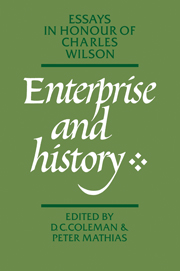Book contents
- Frontmatter
- Contents
- Preface
- List of contributors
- Part I Images and interpretations
- 1 Comparative business history
- 2 Historians and businessmen
- 3 Businessmen and their motives
- 4 La révolution manquée
- Part II England and the Low Countries in pre-industrial times
- Part III Enterprise, finance and politics in the modern world
- Bibliography of Charles Wilson's published works
- Index
1 - Comparative business history
Published online by Cambridge University Press: 12 March 2010
- Frontmatter
- Contents
- Preface
- List of contributors
- Part I Images and interpretations
- 1 Comparative business history
- 2 Historians and businessmen
- 3 Businessmen and their motives
- 4 La révolution manquée
- Part II England and the Low Countries in pre-industrial times
- Part III Enterprise, finance and politics in the modern world
- Bibliography of Charles Wilson's published works
- Index
Summary
The historian's challenge
The historian has at least two exacting and exciting challenges. One is that of relating specific human events and actions to the ever-changing broader economic, social, political and cultural environment. A second is the development of generalizations and concepts which, although derived from events and actions that occur at a specific time and place, are applicable to other times and places, and are, therefore, valuable as guideposts for or as tools of analysis by other historians as well as economists, sociologists, anthropologists and other scholars. They may even be of interest to the informed general public and of some use to actors in contemporary political, social or cultural dramas.
But before such challenges can be met, data are needed. The first step must be detailed description of the actors and their actions; and for business history that means, of course, of businessmen and businesswomen and the enterprises they managed. If descriptions are carefully related to the larger scene, then the second challenge can be taken up. Only after the accumulation of a multitude of case-studies can generalizations and concepts which are not tied to a specific time and place be induced. This paper attempts to describe for the non-specialist the process by which business history, that small sub-field of economic history, has moved from the writing of historically specific descriptive history to the writing of comparative institutional history that can generate non-historically specific generalizations and concepts.
Business history evolves
Business history appeared first as a distinguishable sub-field of economic history in the late 1920s and the 1930s. Its parent, economic history, became an identifiable discipline only a few years earlier.
- Type
- Chapter
- Information
- Enterprise and HistoryEssays in Honour of Charles Wilson, pp. 3 - 26Publisher: Cambridge University PressPrint publication year: 1984
- 16
- Cited by



